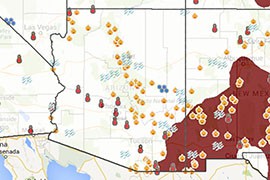Cronkite News has moved to a new home at cronkitenews.azpbs.org. Use this site to search archives from 2011 to May 2015. You can search the new site for current stories.
Arizona program to fight climate-related health issues held out as model
WASHINGTON – An Arizona program aimed at curbing health problems that have come with higher temperatures was cited Tuesday as a model for other local governments coping with climate change.
Arizona was one of seven states and cities highlighted in a report by the Centers for Disease Control and Prevention and the American Public Health Association. That report was cited by the White House as the president unveiled a series of actions to fight climate change and the effects it has on public health.
“There are a whole host of public health impacts that are going to hit home,” President Barack Obama said Tuesday, according to a White House transcript. “The great thing about this conversation is to see all the work that’s already being done by public health officials, the medical community, nurses and families to start raising awareness around these issues.”
Arizona’s Extreme Weather and Public Health program, funded with a CDC grant, targets health issues associated with rising temperatures and other extreme weather events caused by climate change.
Under the program, the state Department of Health Services teamed with the National Weather Service to create a heat emergency communication plan that uses email and social media to get alerts out to health services, schools and residents. “Toolkits,” with brochures and other information, were also used to target children and older adults, the most heat-vulnerable populations.
Arizona is one of 18 states and cities currently funded by the CDC’s Climate-Ready States & Cities Initiative. Other grant recipients cited in the report as success stories included San Francisco, New York City, Minnesota, Maine, Michigan and California.
The CDC initiative follows a five-step Building Resilience Against Climate Effects, or BRACE, framework. It involves identifying possible health issues resulting from climate changes, identifying possible solutions and then evaluating their effectiveness afterward.
So far, the March report said, the program has helped public health officials across sectors coordinate with each other and helped residents “adapt and respond” to flooding and wildfires.
The president acknowledged the health costs that can occur as a result of skyrocketing high temperatures. His remarks came after a roundtable discussion at Howard University on climate change concerns.
“We know that if there are more wildfires, a consequence of rising temperatures, that there are going to be more particulates in the air,” he said according to the transcript. “We know that potentially it extends the allergy season, and can induce greater incidents of asthma or more severe incidents of asthma.”
Donna Bryson, program manager and lung health educator at the Tucson chapter of the American Lung Association, said that asthma triggers differ from person to person. But an increase in any particles that can trigger an attack, such as smoke from wildfires or pollen from a warmer extended spring, could be an issue for most asthmatics.
“Anything that causes an increase in triggers can cause an increase in asthma symptoms,” she said.
Actions unveiled by the president Tuesday included everything from releasing toolkits for health care facilities to convening workshops to improving air quality data.







